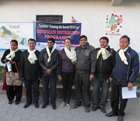On the final day of teacher training one of the participants told me “Maam, we are going to miss you- but you will be always with us in our classes through everything you have taught us!” It was a heart warming moment and I hope that this reflects the views of many of the other participants also.
The teacher training program I was involved in was designed in collaboration with VIN to target key pedagogical strategies for secondary teachers- particularly those teaching Social Sciences. We aimed to explore thinking skills, differentiation, student goal setting and reflection, inquiry based learning and High Impact Teaching Strategies. Teachers were invited from numerous schools in the Kopan area to participate in one of two, four day teacher development workshops.
The attendance varied throughout each day, however 33 teachers in total participated across the two groups. Participants were involved in learning the theory behind recommended strategies, with a strong emphasis on hands on learning for the teachers themselves. Teachers shared the challenges they face in teaching and explored ways to address these. Some key themes included how to cater for the diverse needs of students in their classes, engaging students and making class interesting and helping students become independent learning. Together, we explored the potential of Blooms Matrices and Gardners’ Multiple Intelligences as solutions to these challenges. We also explored the strategies recommended by the Harvard Visible Thinking team.
At the conclusion of the workshops, participants were both motivated to take new ideas and strategies back to their classrooms. They were also very grateful for this opportunity. One participant’s evaluation of the program described it as “from these four days training, I got a golden platform and opportunity to learn about the effective ways of teaching and learning”, while another concluded that “from tomorrow, I am going to change my teaching techniques in my classroom.” As a teacher who has regular access to professional development in Australia, I was pleased to be able to share my knowledge of best practice, and believe that the work of VIN in helping provide access to this kind of training for teachers in Nepal can be greatly beneficial. As one participant noted “this type of training should be shared every year. It helps the teacher become more qualified.”
From a teaching perspective, volunteering my time in Nepal to lead these workshops was both rewarding personally and professionally. Delivering four days of professional development to these groups of young, motivated and inspiring teachers was challenging for me professionally- while also very exciting to see that I was able to bring to these teachers attention strategies which I believe will (and I hope) will make a real difference to these teachers professionally and to their students’ learning. I am grateful of VIN for this experience and strongly encourage any other teacher who is interested in sharing their expertise to volunteer as part of the teacher training or mentoring program.
Rachel Lam
February 2 2014


 Member of
Member of